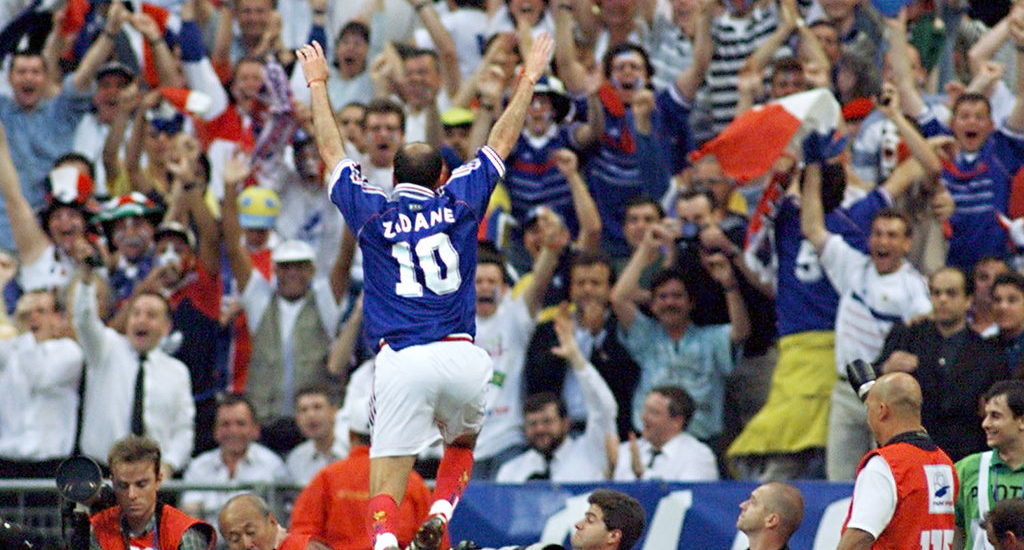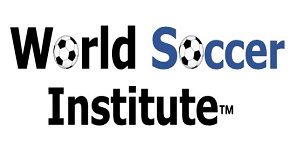- January 6, 2019
- Posted by: worldsoccerinstitute.com
- Category: Business plans

IMAGE: Zinedine Zidane jumped over photographers after scoring France’s first goal in the 1998 World Cup final against Brazil in St. Denis, France. CreditPatrick Hertzog/Agence France-Presse — Getty Images
There has been a deluge of material and events commemorating the 20th anniversary of France’s first and only victory in a tournament that was, lest anyone forget, the brainchild of two Frenchmen: Jules Rimet and Henri Delaunay.
In the week before this World Cup in Russia began, French television networks broadcast three documentaries about the 1998 victory. One film, titled, “Le Sacre d’une Nation,” contained video of a 7-year-old Antoine Griezmann, who, with a friend, was dashing around the French national team’s training ground near Lyon during the summer of 1998 while wearing a No. 7 French jersey.
Among the stars who signed an autograph for Griezmann was Thierry Henry, then just 20 himself.
“Our successors,” Henry said as he looked at the youngsters.
It was quite a scene, quite a comment, but it is up to Griezmann, now wearing France’s No. 7 in the World Cup, and the rest of his teammates to determine just how prescient it turns out to be.
“When I see the quality of today’s French players, especially all these forwards, of course I say to myself, something wonderful is going to happen,” Aimé Jacquet, the long-retired manager of the 1998 team, said.
Griezmann, Mbappé and Ousmane Dembélé failed to generate the collective spark in attack that they had in preliminary games. Defender Samuel Umtiti committed a major gaffe, handing the Australians a penalty kick after inadvertently touching the ball with an extended right fist.
But Les Bleus, as they are called, did manage the essential: winning, 2-1, to share the early lead in Group C with Denmark. Now, as France prepares to face Peru in Yekaterinburg on Thursday, one wonders whether the current manager, Didier Deschamps, will reinsert veterans like Chelsea striker Olivier Giroud, 31, and Juventus midfielder Blaise Matuidi, 31, into his starting lineup, which included no field player over age 27 in Kazan.
Deschamps is this squad’s most obvious link to 1998. He was the captain of that team: a tenacious and technically sound midfielder once dismissed as “a water carrier” by French forward Eric Cantona but who definitively got the last word by getting both hands on the World Cup.
Cantona, so gifted and so volatile, was ultimately not selected for the 1998 team by Jacquet in the interest of unity. Nor was David Ginola, another big attacking talent with a habit of sucking much of the oxygen out of a room.
The parallels to the present day are striking with Deschamps continuing to do without Karim Benzema, the star forward who has been an integral part of Real Madrid’s dynastic run of four Champions League titles in five years.
In 2014, in Brazil, Benzema, both powerful and deft, was at the forefront for France as it reached the World Cup quarterfinals before losing to Germany. But Benzema was placed under formal investigation in France in 2015 over an alleged attempt to blackmail his French teammate Mathieu Valbuena over a sex tape.
The case remains open as Benzema has continued to star for Real, and Deschamps has not recalled him to the national team despite the occasional hint.
In June 2016, after not being selected for the European Championship in France that summer, Benzema, who is of Algerian descent, told the Spanish sports publication Marca that Deschamps had “bowed to pressure from a racist part of France” while saying that he did not believe Deschamps was racist himself.
The comments stung Deschamps deeply, according to sources close to him who spoke anonymously with the French daily L’Equipe.
“That he’s not in this team has nothing to do with football,” said Ibrahimovic, in comments to beIN Sports in Russia. “If the coach has a decision in saying he’s not good enough for this team, then the coach should not be there.”

But Deschamps remains firmly in place as the quest for an encore to 1998 continues. He is still generally viewed as a winner in France and widely admired, although he is no match for Zinedine Zidane at this stage in either department.
Zidane’s back-to-back headers in the first half gave France a 2-0 lead in the 1998 final: an extraordinary rise-to-the-occasion performance that continues to eclipse the 2006 final in the collective French memory. In that game, Zidane used his head less successfully, butting defender Marco Materazzi in frustration and receiving a red card as France went on to lose to Italy in what turned out to be Zidane’s last match as a player.
Zidane’s temperamental streak was nothing new. It is often forgotten in France that he missed two of the seven games in 1998 after getting ejected against Saudi Arabia in the group stage. His goals in the final were his only goals in that World Cup.
But his timing was impeccable, and Zizou, as he is nicknamed, dazzled plenty more in the years to come. He has also managed to go out a winner as a coach, at least for now: surprisingly resigning from Real Madrid last month after the team won its third consecutive Champions League title.
The French news media is already speculating on how long it will be before Zidane takes over from Deschamps with the French national team.
The class of 1998 remains highly visible. This month, Patrick Vieira returned to France to coach O.G.C. Nice in the French first division after resigning his post at New York City F.C. Laurent Blanc, the key defender who scored the sudden-death game winner against Paraguay in the round of 16, has been mentioned as a candidate for the vacant coaching position at Chelsea. Bixente Lizarazu, the thoughtful wingback, is the lead soccer analyst for the French network TF1.
And on June 12, those Bleus were nearly all back in uniform as Zidane and his former teammates played an exhibition match in Nanterre against an all-star squad consisting of players from other nations who also took part in the 1998 World Cup.
The French won, 3-2, with an average of nearly six million French viewers following the broadcast. Not bad for a bunch of middle-aged men playing for kicks and old times’ sake.
The only missing member of the team was Deschamps, who was in Russia with the current squad.
The team he is managing is a particularly promising and diverse group of players with a certain swagger, exemplified by the advertising campaign that a major sporting goods manufacturer recently used to focus on Mbappé.
The slogan for the campaign was: “98 was a great year for French football. Kylian was born.”
That did not happen until December of that year. Until further notice, the date the French still have highlighted on their calendars is July 12.

